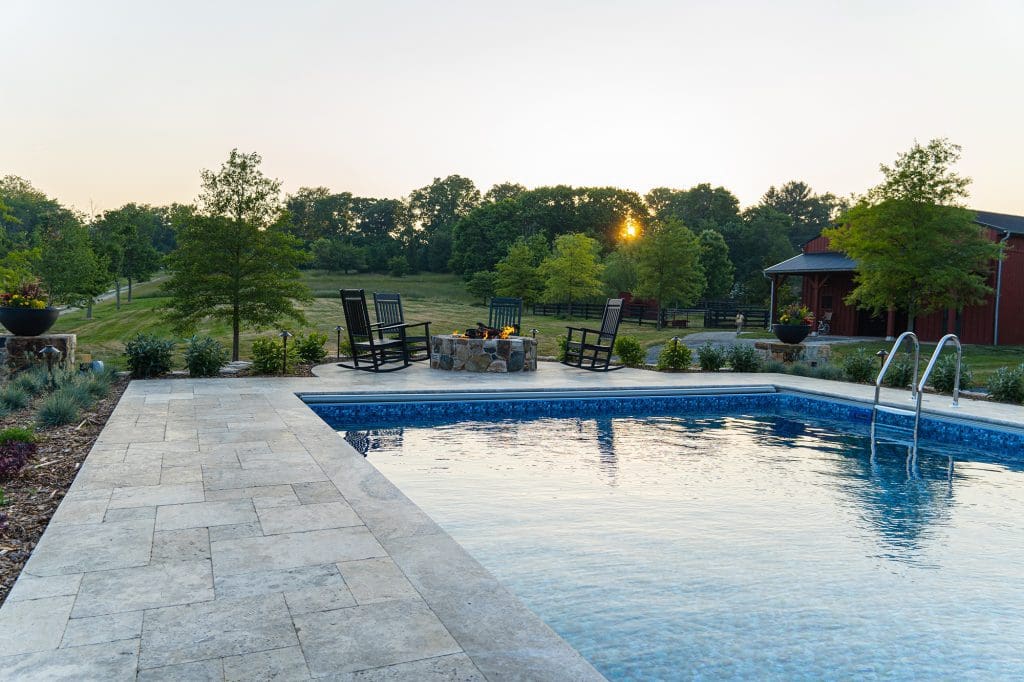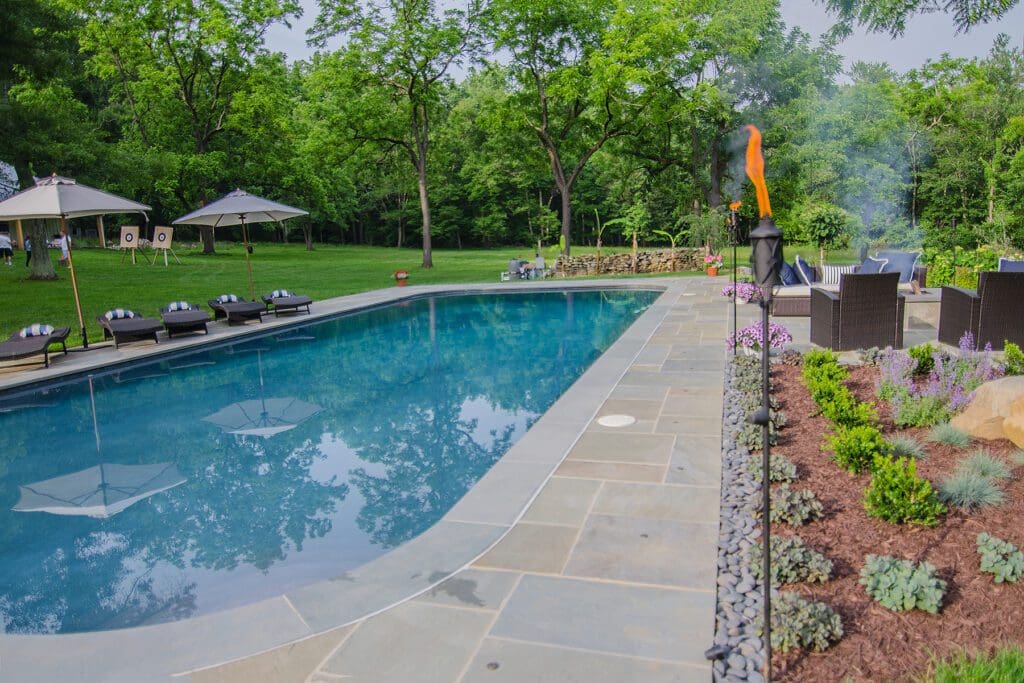Are you in Southeastern Pennsylvania or Northern Delaware and find yourself frustrated with a lackluster pool deck that fails to reflect the elegance and sophistication of your property? These uninspiring spaces can leave you dissatisfied and yearning for a luxurious oasis that complements your lifestyle. You want something durable, heat-resistant, and that looks great in your pool area.
Enter the flagstone pool deck—a premium solution that not only enhances the aesthetic appeal of pool areas but also addresses common concerns such as heat resistance and slip resistance. In this guide, we’ll delve into why flagstone pool decks are the preferred choice for discerning homeowners and how they can transform your outdoor space into a stunning retreat.
Here at Dutchies Stoneworks, we love to build flagstone and travertine pool decks, but we understand that you may have some questions or need some flagstone ideas for your own space. That’s why we’ve put together this post of frequently asked questions (FAQs) about natural stone pool decks, so you have a chance to hear the answers directly from the experts! Keep reading to learn more and get the solutions to your own in-ground pool deck questions.
1. Q: What Is a Flagstone Pool Deck, and Why Should I Consider One?
A: A flagstone pool deck is a surface made from natural stone, typically flat and often irregularly shaped, laid around your pool area. It’s popular among affluent homeowners due to its timeless beauty and durability. Flagstone provides a unique, elegant look that enhances the overall aesthetic of your outdoor space.
Consider a flagstone pool deck for a number of reasons, including the following:
- First, its natural texture offers some slip resistance, making it a safer choice for poolside areas. You should always exercise caution near the pool or when walking on wet surfaces.
- Second, flagstone is heat resistant, so it stays cool underfoot even on hot summer days.
- Additionally, flagstone is highly durable and can withstand various weather conditions without deteriorating.
- Finally, its versatility in colors and patterns allows for a high level of customization, ensuring that your pool deck complements your home’s style perfectly.
2. Q: Is Flagstone the Most Common Material for Pool Decks?
A: The simple answer is yes; flagstone is the most typical material for pool decks. But it’s also important to note that this answer can vary from region to region. For example, flagstone is popular in Pennsylvania and the surrounding areas because it’s the region’s highest-quality stone. Yet, if you look at pool decks in a hotter, sunnier climate like Arizona, the standard material may very well be travertine or concrete.
Flagstone is undoubtedly one of the most sought-after among discerning homeowners. Many people opt for concrete, pavers, or wood due to their lower initial costs and ease of installation. However, flagstone stands out as a superior choice for those looking to combine luxury, durability, and aesthetic appeal.
Flagstone offers unique advantages that other materials simply can’t match. Its natural beauty is unparalleled, providing a one-of-a-kind look that elevates any outdoor space. Its heat-resistant properties and slip-resistant texture make it a practical possibility for poolside areas.
While it might require a higher initial investment, the long-term benefits, such as minimal maintenance and exceptional durability, make it a cost-effective choice in the long run. For those who value quality and elegance, flagstone is the material of choice for pool decks.
3. Q: How Do Flagstone Pool Decks Compare to Travertine?

A: Flagstone and travertine are both excellent choices for pool decks, each offering unique benefits that cater to different preferences. Flagstone is known for its rugged, natural appearance and a wide variety of colors and shapes, which can create a truly custom look. Its rough texture provides excellent slip resistance, making it a safe choice for pool areas.
Travertine, conversely, is a type of limestone with a more refined, uniform appearance. It is typically available in lighter, earthy tones that give your pool deck a clean and elegant look. Travertine is also naturally porous, which allows it to stay cool underfoot and provides good slip resistance.
There are many pros and cons when comparing flagstone and travertine, but there’s a reason we mostly use flagstone when building pool decks here at Dutchies Stoneworks. For example, flagstone actually has a much longer life span because it’s far less porous than most other materials. With a lower porosity, water can’t penetrate the flagstone as it can with travertine, which will break down over time.
Also, because we’re in a colder climate, water seeping into the pores of the travertine stone means freezing can happen in the winter, which can cause the tile to blow apart from the rapid shrinking and expansion of water.
In terms of durability, both materials are highly resilient, but flagstone might edge out travertine in terms of long-term wear and tear. Ultimately, the choice between flagstone and travertine comes down to your aesthetic preference and specific functional needs for your outdoor space.
4. Q: What Are Some of the Most Significant Advantages of Flagstone over Travertine?
A: As we mentioned above, one of the most significant advantages of flagstone is that it lasts longer than travertine and most other materials. You may be paying more upfront, but flagstone’s durability will make up for any repair costs you likely won’t have down the road. Flagstone will also stay looking brand new for longer with all of the proper maintenance—plus, every patio or pool deck will look completely different due to the various natural stone patterns.
While this type of decking can get hot depending on the color (stick to lighter shades for pool decks), it is definitely one of the most skid and slip-resistant materials on the market.
5. Q: Should I Repair or Replace My Current Pool Deck?
A: Depending on the material of your current pool deck or patio, it may be more cost-effective to replace it entirely. Our experts here at Dutchies can help you determine what’s best, but most of our jobs tend to be installing new pool decks, especially because we include them in our outdoor living space packages! Just ask us about the package for more details.
6. Q: What’s the Best Time of Year for Installation?
A: It probably won’t come as a surprise, but extreme weather is not the best for installing flagstone pool decks. The best time to install a flagstone pool deck largely depends on your local climate, but generally, spring and early summer are ideal. During these months, the weather is typically mild, which provides the best conditions for the installation process.
If it’s too cold or too hot, the bonding and curing that happens in the mortar between the stones won’t solidify. But if the temperatures are milder, the mortar will bond much better and make for a better, stronger overall pool deck.
Spring and early summer offer a balance of warm temperatures and low humidity, allowing the mortar and other materials to set properly without the risk of extreme heat or unexpected cold snaps. Additionally, installing your pool deck in the spring means it’s ready for use by the time summer arrives, allowing you to enjoy your new outdoor space throughout the warmer months.
7. Q: How Do I Maintain a Flagstone Pool Deck?

A: Maintaining a flagstone pool deck is straightforward and requires minimal effort. Regular cleaning is essential to keep your deck looking its best. Use a broom to sweep away leaves and debris, and wash the surface with a hose to remove dirt and grime. A mild detergent mixed with water and a soft brush should do the trick for more stubborn stains.
Inspecting your flagstone pool deck periodically for any signs of wear or damage is essential. Look for loose stones or cracks in the mortar and address these issues promptly to prevent further deterioration. Sealing your flagstone deck every few years can help protect it from moisture and staining, extending its lifespan and preserving its natural beauty.
Also, avoid using harsh chemicals or pressure washers, which can damage the stone. With these simple steps, your flagstone pool deck will remain an elegant and durable feature of your outdoor space for years to come.
8. Q: Is Flagstone Still the Best Material Compared to Concrete, Brick, Stamped Concrete, Pavers, Etc.?
A: Flagstone stands out as one of the best materials for pool decks compared to concrete, brick, stamped concrete, and pavers. Its natural beauty and unique appearance are unmatched by synthetic materials. Each piece of flagstone is distinct, offering a custom look that adds elegance and sophistication to your outdoor space.
In terms of functionality, flagstone excels with its slip-resistant surface, making it a safer choice around pool areas. Its heat-resistant properties ensure it stays cool underfoot, unlike concrete, which can become uncomfortably hot in the sun.
Unlike other materials, one of the most significant selling points of flagstone pool decking is that it keeps its color and won’t fade over time. Even with chlorine from your pool washing over it regularly or the sun beating down on it in the summer, flagstone is our favorite because it will always look so timeless and beautiful!
9. Q: What Are Some Flagstone Ideas for My Pool Deck?
A: When it comes to designing your flagstone pool deck, the possibilities are nearly endless. One popular idea is to incorporate a mix of flagstone and travertine for a visually striking contrast. This combination not only enhances aesthetic appeal but also leverages the benefits of both materials.
Consider creating intricate patterns with the flagstone. You can opt for a random, natural look with irregular shapes or a more structured appearance with geometric designs. Mixing different colors and textures of flagstone can add depth and interest to your pool area.
Adding complementary features such as stone walkways, retaining walls, or integrated seating areas can further elevate the space. For a luxurious touch, consider installing ambient lighting within the stonework to highlight the unique patterns and create a warm, inviting atmosphere during evening gatherings.
Ultimately, your flagstone pool deck can be customized to reflect your personal style and enhance the overall beauty of your outdoor space.
Ready for Your Own Flagstone Pool Deck?
Transform your outdoor space into a luxurious retreat with a custom flagstone pool deck. At Dutchies Stoneworks, we specialize in designing and installing high-quality flagstone and travertine pool decks that enhance the beauty and functionality of your backyard. Our team of expert stonemasons brings over 70 years of combined experience to every project, ensuring meticulous craftsmanship and exceptional results.
We offer personalized design consultations to help you visualize your dream pool deck. Using 3D renderings, you can see how different patterns, colors, and textures will look in your space before the installation begins. Our commitment to quality means you can expect a durable, slip-resistant, and heat-resistant pool deck that stands the test of time.
Don’t settle for an ordinary pool area. Elevate your outdoor living experience with a stunning flagstone pool deck. Schedule a design consultation with Dutchies Stoneworks today and take the first step toward creating your own backyard oasis.

